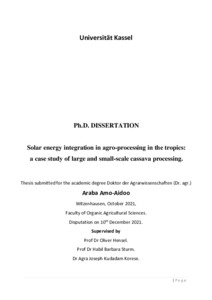| dcterms.abstract | Agro-processing is key to reducing post-harvest losses. Agro-processing is defined as a set of techno-economic activities applied to all the products originating from the agricultural farm, livestock, aqua cultural sources, and forests for their conservation, handling, and value-addi-tion to make them usable as food, feed, fibre, fuel, or industrial raw materials [12]. Processing can be sophisticated (relying on industrial plants and machinery) or simple (depending on the sun or indigenous small-scale processes). The industrial-scale processing is mainly dependent on electricity, whiles the small-scale applications are mostly not. However, the quality and duration of the processing are improved with the availability of electricity. Most agricultural produce can be processed into so many products. In Ghana, grains are usu-ally processed into flours, tubers into chips, fish into powders and leaves into powders in the food sector. Some industrial plants use agricultural produce as their raw material, such as bio-fuel plants. Other uses also include animal feed and biogas production. This study focuses specifically on cassava processing as a case study crop, although findings are replicable and scalable to other crops. Cassava processing in Ghana is mainly by drying the roots and milling them into flour. The peels, leaves and stems serve as animal feed. However, the leaves are also in some sauces for human consumption. The few large-scale processors use cassava for starch and bioethanol production. However, the transition to bioethanol is increasing, similar to China. | eng |

